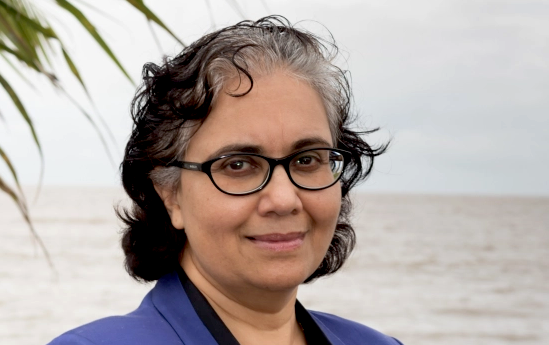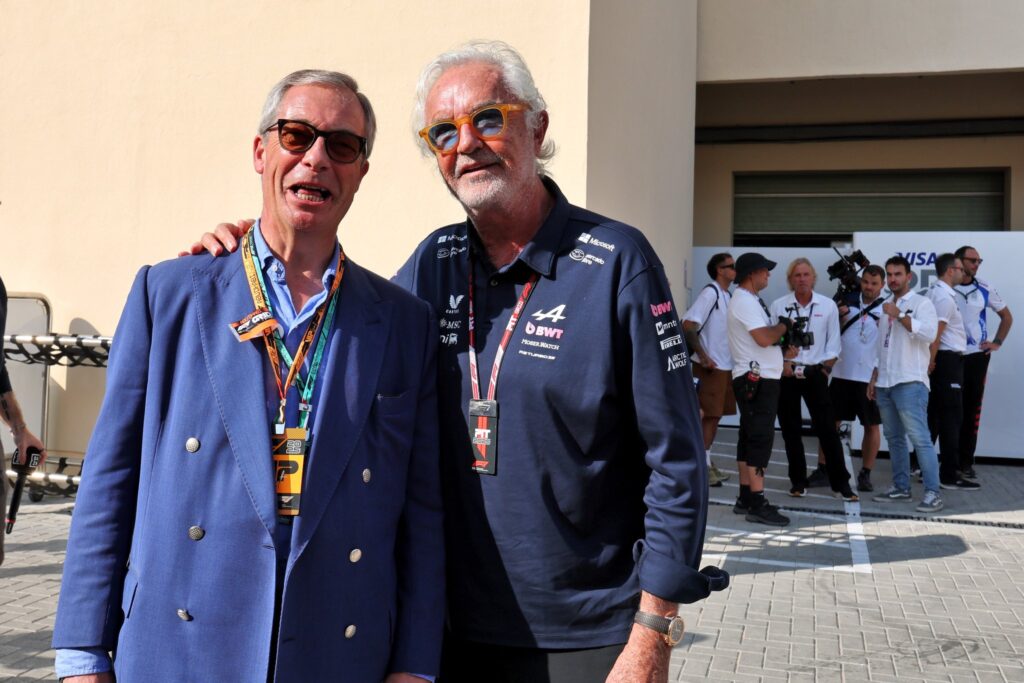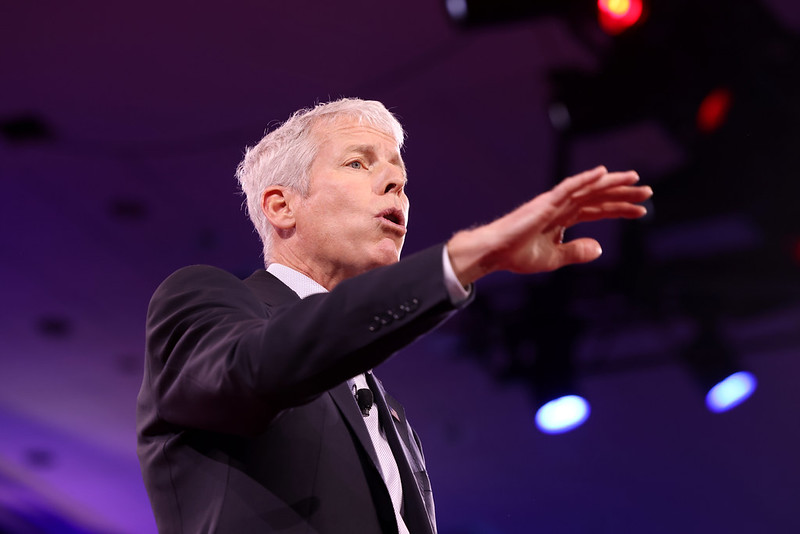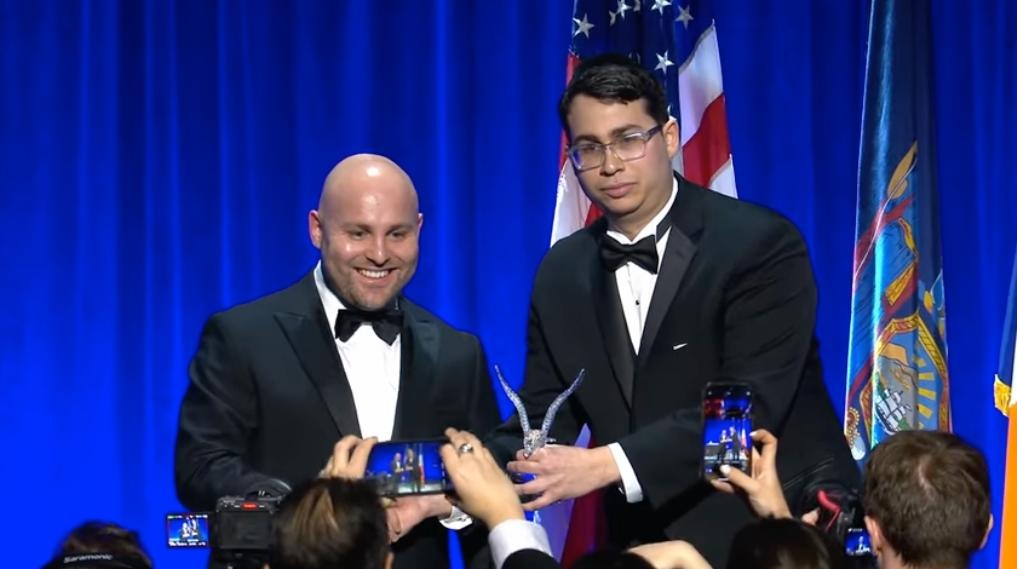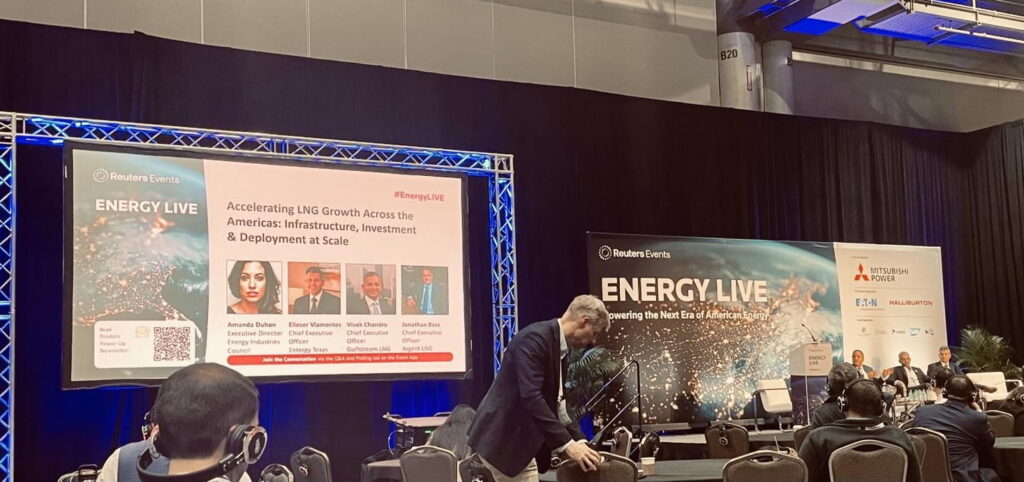A video of this interview can be seen by registering for the Climate Consciousness Summit 2024, staged by the Pocket Project in partnership with DeSmog.
Building cases on laws she wrote into the statute books 30 years ago, Melinda Janki is deploying every conceivable legal strategy in her bid to halt ExxonMobil’s fast-growing oil drilling operations off the coast of Guyana.
The Houston-based oil major discovered oil in ultra-deepwater fields in Janki’s home country in 2015, and has since named the project its most successful offshore venture, and a “jewel in the crown” of its global portfolio. ExxonMobil and its partners hope to ramp up output from Guyana — which borders Venezuela, Brazil, and Suriname — to more than a million barrels a day over the next few years.
Burning all of Guyana’s estimated offshore reserves of at least 11 billion barrels would release about five gigatons of planet-heating carbon dioxide — the equivalent to ten times the amount of greenhouse gases the UK emitted last year.
The eight cases Janki has filed since February 2018 have already highlighted the risks to investors associated with offshore oil exploration in the Caribbean. By seeking to prove that ExxonMobil and the government are in breach of existing environmental laws, the Guyanese lawyer and her team say their “rule of law” approach could serve as a model for litigation against fossil fuel companies in other countries.
In an interview for the Climate Consciousness Summit 2024, Janki spoke about the various legal avenues she and her colleagues are pursuing; the victories they have won; and the need for the climate movement to focus on shutting down the fossil fuel industry as fast as possible.
Janki, who won the Commonwealth Lawyers Association Rule of Law Award in 2023, also spoke about the risks an oil spill could pose to the Caribbean; the growing impacts of the climate crisis on Guyana’s population of 800,000 people; the imminent threat rising seas pose to the capital Georgetown; and the strength she draws from connecting with nature.
Subscribe to our newsletter
Stay up to date with DeSmog news and alerts
ExxonMobil did not immediately respond to a request for comment. The company has defended its Guyana operations, saying it has operated in compliance with the country’s laws, and that its contracts with the government — which critics say are heavily skewed in favour of the oil industry — reflect the risk assumed by the various parties. Guyana’s government has argued that any move to prevent it developing its oil would bring “unwarranted” economic and social costs.
The video interview can be seen by registering for the Climate Consciousness Summit 2024, staged by the Pocket Project in partnership with DeSmog. The below is an abridged and lightly edited transcript.
Matthew Green: What makes you think you can beat ExxonMobil?
Melinda Janki: The short answer to the question, ‘why do I think we can beat ExxonMobil?’ is because we’ve already beaten them. Last year, we had a court ruling that required ExxonMobil Corporation to provide an unlimited, uncapped parent company guarantee [to pay damages in the event of an oil spill or other disaster], and The Guardian said that knocked about 12 percent off Exxon’s share price. The judge said that Exxon in Guyana had engaged in “disingenuous conduct”, which was designed to mislead. But we’ve had a string of other victories as well, including cutting their [environmental] permits down from 20 years to five years. Big Oil is vulnerable, we can beat Big Oil, and we are beating Big Oil in Guyana.
Green: You’re actually relying on clauses in the Constitution and the country’s environmental laws that you wrote?
Janki: Yes. The motivation behind all of these cases is that if people come to Guyana, then they have to obey national law. That’s why in 2023 the Commonwealth Lawyers Association gave me the Rule of Law Award for this work to uphold the rule of law, particularly in the fossil fuel industry.
Many of the cases are using the Environmental Protection Act, which I drafted many years ago, and which, for example, requires companies to take into account their impact on the climate, their impact on the atmosphere, their impact on the ocean. And I should say that goes back to 1996 — so long before people were really talking about climate, long before they were talking about ocean acidification.
Several of our cases have been showing claims that Exxon is not complying with the conditions of its permits, or with the requirements of the Environmental Protection Act; and that the Environmental Protection Agency is not complying with its statutory obligations.
In fact, last year, the judge ruled that the Environmental Protection Agency — using this wonderful phrase — was in “a state of laxity and condonation” and put Guyana at risk of a catastrophic event. So the judge has pointed out that the Environmental Protection Agency is just not doing its job. They’re not following the Environmental Protection Act. That’s the backbone of many of our cases, “look, you have to do your job.”
Green: What’s keeping you going in fighting round after round against Exxon?
Janki: Well, that’s very simple: Either we fight the fossil fuel industry and we survive, or the fossil fuel industry survives. It’s one or the other. There is no way that this earth can continue with a fossil fuel industry. There is no way that life on earth can continue with fossil fuels. So I don’t think we have a choice. We have to stop the fossil fuel industry, and we have to stop it now.
Green: Why is this case being so closely watched in other parts of the world?
Janki: I think the real lesson for people is, “look, the fossil fuel industry is here to make money, that’s all.” They don’t care about human rights, no matter what they say. They don’t care about social justice, no matter what they say. They don’t particularly care about their social license to operate, no matter what they say. And they don’t care about energy security. What they really care about is money. ExxonMobil came to Guyana in order to make money, and that’s it. They understand power. If you really want to have any impact, you have to look at what matters to the oil industry, and that is money. I don’t think that it’s very helpful to be going to court on social justice issues, but that’s just my view, and that’s not what we do.
What I do is I lead a team of excellent lawyers in private practice who can hold their own against the best, and that’s what it takes.
Green: You mentioned this unlimited parent company guarantee. Could you unpack what that means and why that’s important?
Janki: The oil operations offshore Guyana are very dangerous. They’re taking place about 120 miles out. The ocean is about a mile deep, and the oil itself is maybe two miles below the sea bed. So you can imagine the pressure that that oil is under. I understand that ExxonMobil is operating above the [safety] limits set for their floating production, storage and offloading vessels. The limits are set in the environmental impact assessment, and they have said that they are operating those above those limits, which makes it even more dangerous.
Now there are oil spill maps produced by Exxon. I’m only using their material, which shows that in the event of an oil spill, oil could reach Jamaica, which is thousands of miles away. So we face potential devastation of the Caribbean islands. Who’s going to pay for that if it happens?
Bear in mind the courts have already said that the Environmental Protection Agency is not doing its job and not regulating ExxonMobil Guyana properly, not making them comply with their permits the way they should be. So the danger goes up all of the time.
Guyana doesn’t have the money to compensate anybody. Guyana doesn’t have the ability to deal with an oil spill. Nobody does. Just think back to the BP Macondo well blowout, which devastated the Gulf of Mexico. The Gulf hasn’t recovered. Nothing recovers from an oil spill. People think it’s okay because oil basically disappears, but it’s there in the ocean.
So Guyana has no way of coping with an oil spill, and we have to make sure of two things, one that it doesn’t happen, hence these cases, and the other is that if it does happen, it’s ExxonMobil that pays for the damage caused by their operations, not Guyana and not the people in the Caribbean whose livelihoods will be destroyed, whose environments will be destroyed. So it’s basically the polluter pays. You want to do these operations, you pay for the pollution.
Green: So you’re saying, before you brought this case, that it was Guyana that would have been liable to pay compensation for an oil spill?
Janki: Yes. Guyana will be picking up the bill unless Exxon puts up the money. Now, the order was made for this unlimited, uncapped parent company guarantee to indemnify the Environmental Protection Agency and the government of Guyana. And also we got an order that they have to put in place insurance because they had no insurance in place, either. They had put an insurance document in court, and when we looked at it, the insurance was actually for Egypt, not for Guyana. So you can see that the regulatory agency is really not doing its job.
After this, the Environmental Protection Agency appealed against the order in their favor. The government of Guyana — the attorney-general — has joined the case on the side of Exxon to argue that Exxon should not have to produce a guarantee to protect Guyana, so you can see what we’re up against. And of course, Exxon in Guyana has also appealed against this, and we’re waiting for the Court of Appeal to hear this case.
Green: A lot of people are seeing this as an economic opportunity for Guyana. What kind of pressures have you been under to step back from this kind of work?
Janki: There isn’t huge money here. The way the deal works is Exxon — and its two partners, Hess [Corp] and CNOOC [China National Offshore Oil Corporation] — get to take 87.5 percent of Guyana’s oil for free. Guyana then takes the remaining oil and has to sell it on the market. None of them pay any taxes. They recover all their costs, which is why they get so much of Guyana’s oil for free. And Guyana gets a two percent royalty. So there is really very little money for Guyana in this, plus the huge risks, you still have all the damage to the ocean that is going on.
The total reserves are estimated to be around 13 billion barrels. So if — and this isn’t going to happen, but if, for the sake of argument — they were able to extract and burn all of that oil, we are talking about more than five gigatons of carbon dioxide going up into the atmosphere, and dissolving into the ocean. The reason I say it’s not going to happen is because the fossil fuel industry is not viable, so it is going to collapse. It’s a question of when, not if.
So, in addition to destroying Guyana’s natural capital, Exxon could well leave Guyana with the costs of shutting down those oil wells and decommissioning costs running into billions. And the United States knows this very well because they have orphan wells which cost billions of dollars to shut down.
Green: I’m curious to hear about the climate change impacts that are already hitting Guyana, which surely must already be very considerable?
Janki: When I’m on my computer, for example, I get a little message at the bottom that shows the temperature, and very often it’s a record, or near a record. We’ve had unprecedented floods in the interior of Guyana, washing away people’s homes, killing livestock. We had a massive flood in 2006 which basically put Georgetown underwater, and people were living on the first floor of their houses because the flooding was so bad, and that basically cost almost two-thirds of Guyana’s GDP.
What’s really important for people to understand is that Georgetown, the capital city of Guyana, is below sea level. So my house is below sea level, and we’re protected by a very small sea wall that’s about three or four feet high in places. Behind that, you have the mighty Atlantic. With rising sea levels, this is not a good position for Georgetown to be in. So every day that the government is allowing Exxon Mobil to extract oil is a day in which the government of Guyana is saying to people “we don’t care about you, we are going to continue to pollute the atmosphere with greenhouse gasses in order to get some money,” knowing full well that Guyana is one of the most vulnerable nations on the planet to rising sea levels, to climate change, and the government has openly admitted this. So we have a situation where it’s estimated that Georgetown will be covered by the ocean by 2030.
Green: How does the climate movement respond now?
Janki: I would say, Look around you. Is it not obvious that what we have to do right now is shut down the fossil fuel industry? How many more people have to die? How many more animals have to die? How many more forests have to burn? How many more species have to go extinct? How many? I mean, just ask those questions. How many more? And the answer ought to be none. We have to stop fossil fuels now. And you know this is not a difficult thing to do. Governments are subsidizing the fossil fuel industry to the tune of $7.1 trillion in 2022.
Remove those subsidies right now, and the market will deal with the problem. The fossil fuel industry will cease to exist, and we can move immediately to renewable energy.
Green: Why is it that we’re struggling to get a hold of this existential threat?
Janki: The answer has got to be the fossil fuel industry and the lies that they have told. For example, we’re talking about climate change. Climate change is a symptom. What is the problem? The problem is greenhouse gas pollution. It’s polluting the atmosphere and causing global overheating, which in turn causes rising sea levels, the breakdown of the global climate system, the melting of the polar regions, a warming ocean, which means it’s more inhospitable to marine life. But those are symptoms, and what the fossil fuel industry has done very cleverly, is to say to people, oh, “focus on the climate.” You can’t fight the climate. You can’t blame the climate. It’s not a human being. But if you think about this, it’s pollution, greenhouse gas pollution. We know who the polluters are. Find them. Shut them down.
Green: Where do you think the climate movement is going wrong?
Janki: The climate movement has some absolutely brilliant and wonderful people in it. And I’m not in any way wanting to criticize people , many of whom now are feeling despair, but I do think that there is a story here of false hope. Let’s take the Paris Agreement, which in 2015 was celebrated as a great breakthrough, and the climate movement lined up behind the Paris Agreement. Well, where are we today? The Paris Agreement is dead. We’ve gone past 1.5 degrees centigrade. We’re on track for probably three degrees centigrade now, and that was a story of false hope.
Between 1992 and 2015 greenhouse gas pollution has rocketed up to 415 parts per million, and yet those negotiators sat in that room and condemned the earth to global warming of at least 1.5 degrees, knowing that at one degree, we start to lose corals, knowing that species will go extinct long before you get to 1.5. I think that it was dangerously irresponsible for those negotiators to do that.
Green: We’re speaking hours after it looks very likely that Donald Trump will be the next U.S. President. How does the climate movement maintain momentum?
Janki: I think we have to come to terms with reality. We have to look at the truth and embrace it, and that liberates us to act. Stop those subsidies immediately. Stop the polluters. We need to get to what people call negative emissions. So this talk about net zero by 2050, about bringing the curve down — this is also false hope right now. Everybody needs to become a carbon sink, and this is where I think Guyana is so interesting, because we are a carbon sink. Our forests take out 150 million tonnes of carbon dioxide every year. We are the climate leader on the planet, and the government is squandering that climate leadership role by running after the chicken feed that Guyana is getting from the oil deal with Exxon Mobil. So the future is now: Move to renewable energy, as people are already doing. Move to carbon sinks.
Green: We see headlines about the ‘carbon bomb’ that Exxon Mobil is detonating in Guyana. You’ve sometimes taken exception to that phrase.
Janki: What you have here is one of the blind spots in the climate movement. People say, “Oh, but Guyana’s a carbon bomb that could be let off.” Actually, we’re a carbon sink, so you need to take that into account right now. And the second thing is, there are ongoing carbon bombs. The United States is the biggest ongoing carbon bomb on the planet. They pollute the atmosphere with more carbon every year than will come from all of Guyana’s oil resources. Don’t come and tell me that my carbon sink country is a carbon bomb while you’re sitting comfortably in your ongoing carbon bomb society.
Green: I’ve never been to Guyana, sadly, but I’d love to hear a little bit more about life in Georgetown. It sounds like you live a lot closer to nature than certainly I do living in southwest London.
Janki: Bear in mind, I’m living in a capital city, but even so, I have around me a mini-ecosystem, a very green space. IIn 2020 the government shut the markets unexpectedly, I didn’t have time to go and buy food, and I had enough stuff growing in the garden that I could eat for the few days until they came to their senses and realized that actually people need to have vegetables and fruits to eat.
I have a very small garden, but I have about 85 trees in it, This is a tropical country, so everything grows. If you were to visit me, Matthew, I would have to say to you, if you come in one evening, look, be very careful going up the steps, I can’t switch the light on for you. In fact, I haven’t switched the light on for 20 years because there is a bird’s nest on it, and every year the birds are there. So you’d have to be very careful.
If you came into my house, I would say to you, don’t use the wine glasses. I don’t drink here, but I do use the wine glasses to sometimes catch the little frogs that come in before the cats get to them, or sometimes the grasshoppers, or, whatever it is that happens to be visiting me at that particular time so I can get them outside to safety.
In the evening, you would hear the frogs. this incredible, beautiful orchestra. I call it an orchestra because you can hear the little ones that make a tremendous noise, and the big ones that are actually a bit more muted. It really is like an orchestra. This is just life.
There are bats, or birds coming into my house. Sometimes I look out the window at night and I watch the bats. There are swallows. There’s a particular season when the peregrine falcons arrive. I’ve had more than 30 species of bird just in my garden, which is tiny. Sometimes we find the little snakes and we catch them and put them back into the water. There are fish right outside the gate to my home. It’s full of life, absolutely full of life. And all of this is slated to be underwater by 2030 because of the fossil fuel industry, because people will not say “no” to that industry now, but imagine that we have time, and we don’t have time.
If we think, for example, of the movement for the Fossil Fuel Non-Proliferation Treaty, we don’t have the time for that. It takes at least 10 years to get a new treaty, and even when you have a treaty, it can be meaningless. We already have the United Nations Framework Convention on Climate Change. We already have the Paris Agreement. We have treaties coming at us from every direction, and that’s made no difference. So it’s futile to be asking for another treaty. Let’s just shut the industry down, now, using what we have.
Green: How do we tune into the role that is ours to play at this time?
Janki: I think in every single person, there is one thing that only they can do. When you look deep inside of yourself and you realize who you are, and you live in harmony with that, then you will see what it is that you should do. But I don’t think you can do that disconnected from nature. I really think that one of the reasons we are in the situation that we are in is that the decision-makers are disconnected from nature. They don’t wake up to birdsong. They don’t encounter non-human life generally. They have concrete and steel and hard pavements where you can’t walk barefoot and you never feel the grass. You have to connect back, I think, with Mother Earth, with nature — whatever you want to call it, but you have to connect back.
Green: What is the best way for people to join or support what you’re doing?
Janki: Telling the story of victory against the oil industry, because I only gave you one or two examples, but there are so many more.
Earlier this year we had the Caribbean Court of Justice. We lost that case, by the way, so I’m not going to pretend we won it. But the Court said that Exxon’s co-venturers Hess and CNOOC are not allowed to extract oil under their petroleum production license, because they did not get an environmental permit. The court also said that Hess and CNOOC have joint and several liability with Exxon, which means that Hess and CNOOC now have uncapped, unlimited liability.
The Court said that they have to have complete transparency over their operations. And they cited the Escazú Agreement, which is a regional treaty that I had worked on at the very beginning. They said, public interest litigants who are in good faith trying to protect the environment, the courts must not award costs against them. So this is a huge step forward. Combine that with the rulings that we have on liberal standing for litigants, and we’re opening up space now for people to come to the courts and hold the oil industry to account.
So I think one of the things people can do is stop focusing on the climate. Don’t, don’t despair, but let’s do what we need to do to shut the industry down. Don’t get distracted by the false hope of the Paris Agreement and other movements like that. Don’t get distracted by the false hope of the Fossil Fuel Non-Proliferation Treaty. The problem is fossil fuel pollution. Stop it. Lobby your governments, bring the cases, support our work if you want to, but just do it. And then there’s no need for despair, because then we know we’re crafting a future for ourselves, for the other species we share this planet with, and for our descendants.
A video of this interview can be seen by registering for the Climate Consciousness Summit 2024.
Subscribe to our newsletter
Stay up to date with DeSmog news and alerts


